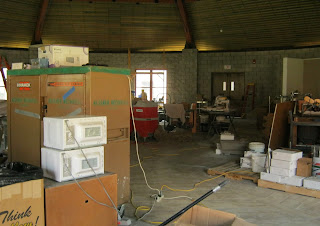NOTE: The following is the homily delivered this day in the Archabbey Church by Fr. Guerric DeBona, O.S.B., on this Feast of St. Stephen. Here, he considers the troubling juxtaposition of the joy of Christmas with the bloody martyrdom recalled in the feasts which fall within the Christmas Octave: St. Stephen, the Holy Innocents on December 28, and St. Thomas Becket on December 29.
***
I will never get the Christmas Octave. I
don’t know about you, but these days following the joyful celebration of the
Lord’s Nativity continue to baffle me.
Unlike the Easter Octave, these days
seemingly lack a sense of continuity, happiness, and peace certainly present in
the eight days celebrating the Lord’s Resurrection; that time cascades us
though Christ’s appearances, echoes the Spirit’s power in the Acts of the Apostles, and draws the
Church into the transcendent sequence Victime
Pascale Laudes.
By contrast, after unbundling the joy of yesterday’s
solemnity, the Church today wears red—not to extend yesterday’s peace as much
as to razor us jarringly into the often gruesome deaths of martyrs. Stephen,
Thomas Becket, and the Holy Innocents create a path for the Christian community
which resembles nothing less than wading through rough terrain with more than
occasional glimmers of dangerous broken glass.
Paradoxically, it would seem as if secular
culture excels at extending the joys
of Christmas. People receive bonus
checks and often have off several of the days following Christmas to spend with
their families. Not a few parents will be gingerly assembling a young child’s
doll house or mustering instructions for the latest video game. There will be
visits to the Miracle Mile in Chicago or the Ice Rink at Rockefeller Plaza on
Fifth Avenue, not to mention office parties and open house get-togethers amid
the dazzling lights on Christmas trees. These are the “Partridge in a Pear Tree” days of “four calling birds, three
French hens, and two turtle doves.” They delightfully extend Christmas Day into
not just a few, but 12; people of good will then are all led back to the stable
and join the Wise Men on the Epiphany.
Sounds like a good idea to me; nobody
ever dies when friends raise a fluted glass of asti spumante and kiss under a mistletoe. So, I ask again: who put
the bloody Octave in Christmas?
Well, I will hazard a guess. St.
Stephen, Deacon and Proto-Martyr, put the Octave in Christmas by kick-starting
sober Christianity’s service written in blood. The difference between the
Easter Octave and these days following Christmas is that this Octave concerns witness while Easter realizes its
fulfillment.
Stephen’s diaconate of service and
testimony becomes linked with Christ’s own witness when the Lord says in
today’s Gospel (Matthew 10:17-22): “You will be hated by all because of my
name, but whoever endures to the end will be saved.” These are sober words
about real life Christian testimony, which traces its origins to St. Stephen. And
indeed, the account of Stephen’s stoning in Acts (6:8-10; 7:54-59) mirrors Jesus’
own self-gift and surrender and service.
Ironically, in Acts, Luke uses the
word “martyr” or “witness” to describe the folks who laid down not their lives,
but their garments at the feet of the
arch-persecutor of the Church, Saul of Tarsus. Clearly, there are many ways of witnessing, but the only authentic testimony is linked to
Christ’s own. As the responsorial psalm today reminds the Church, we are taken
up into Christ’s sacrifice by the witness of the true martyr Stephen: “Into
your hands, O Lord, I commend my spirit.”
So Stephen’s death, which we commemorate
this day, sets the tone for what we rightly call the Christmas Octave because
the witnesses who follow the Lord’s Nativity make his coming in the flesh an ongoing
historical reality. By contrast, the office parties, the new toys, and the
holiday sales will all be left as so much tinsel on the ground, together with
last year’s Christmas tree. Jesus’ less than charming admonition to his
disciples acknowledges the reality of his coming a human being in time, in a
world which did not receive him.
His disciples will certainly provoke
wrath with their testimony because witness
is, by definition, never done in secret. Witnessing must become proclamation,
which Stephen himself does in recounting Israel’s history in a new way, now
that the Messiah has come. “A clear and unequivocal proclamation,” Pope Paul VI
says, is the result of witness because “there is no true evangelization if the
name, the teaching, the life, the promises, the kingdom and the mystery of
Jesus of Nazareth, the Son of God, are not proclaimed.” Even in his last breath,
Stephen proclaims the name, as he asks the Lord to receive his spirit.
The Feast of Stephen asks us to exchange
our white baptismal garment for a red one. The witness of monastic life each
day begs that the Lord receive our spirit in service and fraternal charity.
I
have a sense that sincere and authentic witness as proclamation is becoming
more and more urgent these days for the Church as it evangelizes the Word
become flesh in this culture. Some say we are currently living in an
environment of post-truth, where lies and falsehoods traffic as history. Social
media can fabricate and weave and unweave stories in a tapestry which rivals
Penelope’s long-suffering stitching in Ithaca as she waits for Odysseus to
return.
Until Christ comes again, it is the Church’s mission to be at the ready
to unravel lies, proclaim the truth, and retell history through the lens of
God’s coming in the flesh: good news
to those held captive by poverty and injustice, liberty to prisoners, sight to
the blind. And our lives and speech will proclaim that truth again and again,
just like the first martyr.
May St. Stephen,
deacon and proto-martyr, make us better witnesses to the Kingdom and to the
Anointed One who has so sublimely come to bring that Good News to our heart’s threshold.
































